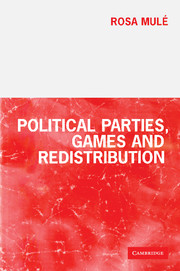Book contents
- Frontmatter
- Contents
- List of figures
- List of tables
- Acknowledgments
- Introduction
- 1 Political parties, games and income redistribution
- 2 Opposition effects, blackmail and u-turns under Pierre Elliot Trudeau
- 3 The arithmetics of politics under Margaret Thatcher
- 4 Right-wing ascendency, pivotal players and asymmetric power under Bob Hawke
- 5 The demise of the federal social safety net under Clinton
- 6 Conclusions
- Technical addendum
- Bibliography
- Index
3 - The arithmetics of politics under Margaret Thatcher
Published online by Cambridge University Press: 22 September 2009
- Frontmatter
- Contents
- List of figures
- List of tables
- Acknowledgments
- Introduction
- 1 Political parties, games and income redistribution
- 2 Opposition effects, blackmail and u-turns under Pierre Elliot Trudeau
- 3 The arithmetics of politics under Margaret Thatcher
- 4 Right-wing ascendency, pivotal players and asymmetric power under Bob Hawke
- 5 The demise of the federal social safety net under Clinton
- 6 Conclusions
- Technical addendum
- Bibliography
- Index
Summary
POLITICAL BACKGROUND
The aim of this chapter is to analyse the politics of income redistribution in Britain under the Conservative governments of Margaret Thatcher. Most political commentators have concentrated on the economic advances of the Thatcher era, rising prosperity, the spread of home ownership, the drastic drop in inflation, and the reduction of the budget deficit. It is now clear, however, that the economic benefits have not been equally spread, with the rich becoming richer and the poor relatively poorer (Atkinson, 1995b; Goodman, Johnson and Webb, 1997). In February 1998, the latest evidence of the ‘Rowntree Inquiry into Income and Wealth Distribution in the UK’ provided a devastating account of the process, showing that income inequality in the mid 1990s reached a higher level than recorded since the war (Hills, 1998b).
This amplification of income inequality surely stemmed from a plurality of causes. When the Conservative Party returned to power in 1979 with the biggest turnover of seats since 1945, the economy was in the throes of the most severe recession since the 1930s, with double digit inflation and soaring unemployment. As a trading nation Britain had been vulnerable to world-market trends, but the economic crisis of the late 1970s had been exacerbated by Britain's demise as a great power (Gamble, 1995a: 33).
Many supporters of the Conservative government viewed the welfare state as amain cause of the sluggish economy. Conservative intellectuals believed that ‘egalitarianism [had] accompanied Britain's economic decline’ (Joseph and Sumption, 1979: 12).
- Type
- Chapter
- Information
- Political Parties, Games and Redistribution , pp. 82 - 115Publisher: Cambridge University PressPrint publication year: 2001

